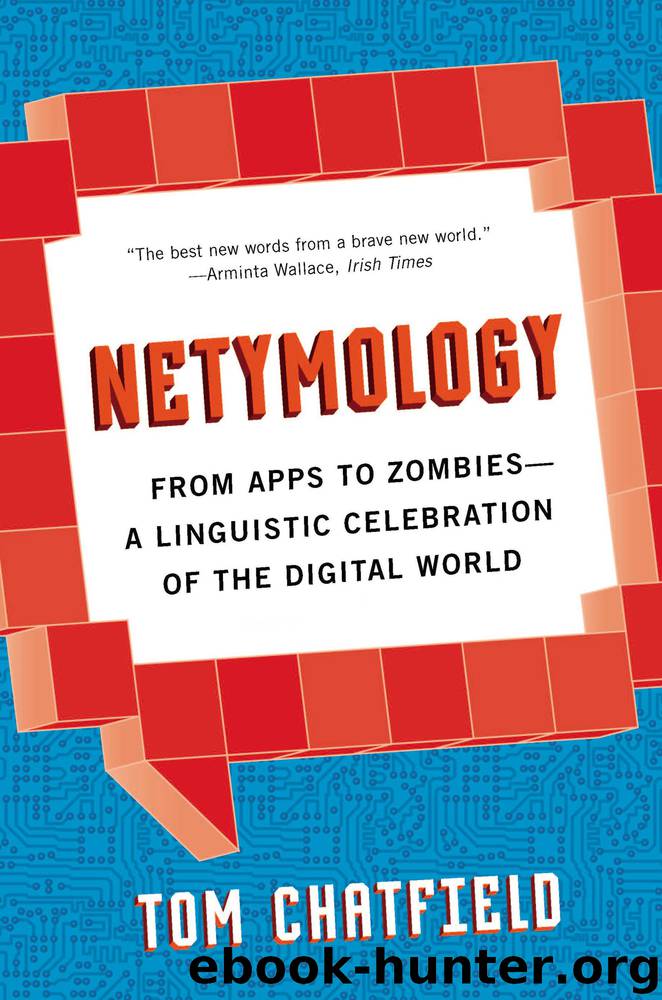Netymology by Tom Chatfield

Author:Tom Chatfield
Language: eng
Format: epub
Tags: LANGUAGE ARTS & DISCIPLINES / Linguistics / Etymology
Publisher: Quercus
Published: 2016-08-09T16:00:00+00:00
59.
Facepalms and *Acting Out*
Some of the central innovations of online communications lie in techniques for adding emotional and physical information to a conversation typed while seated at a computer. And some of these techniques involve a very particular layering of levels of self-awareness.
Consider the term facepalm—a popular typed shorthand describing the act of slapping your own forehead with an open palm, to indicate wordless despair or frustration at someone else’s words or actions. As a compounded word, facepalm appears to date from the mid-2000s—often accompanied by a matching pop-cultural image, including one famous still shot of Captain Jean-Luc Picard from the “Déjà Q” episode of Star Trek: The Next Generation—although the gesture itself is far older.77
What’s interesting, however, is the precise meaning of writing such a word during an online exchange. When I type out the word facepalm, nobody actually thinks that I’m dropping my own head into my hand (even though I may be doing so). The agreed convention, rather, is that typing this neatly compressed term is an efficiently vivid way of suggesting—through a word—that I consider myself lost for words.
Especially when it forms a part of a larger sentence or description, facepalm is sometimes written within asterisks during an online chat. For example, if someone I was chatting to asked me “So, is London a part of England?” I might reply “I can’t believe you’re actually asking me that *facepalm*.” (With a nod to the typing conventions of online gaming, it’s also increasingly common to write “/facepalm,” as a forward slash is typically used to enter “action” commands via an online game’s chat interface.)
The typographic convention of placing a description of physical actions within asterisks was established early in the history of the internet as a standard form of chat room and forum etiquette, and one with richly inventive possibilities. Often, there’s an element of humor or sardonic undercutting to the practice, or a desire to express something more complex than standard abbreviations for “actions” like LOL or ROFL allow.
If I wish to be self-deprecating after introducing a complex idea, I might type something like “*crosses fingers, hopes no one will ask him to explain*”; if I feel embarrassed, it might be more along the lines of “*creeps into corner and closes eyes with shame*.” You’ll notice that in each case the standard formulation involves the present tense and the third person singular, as if when I type an action inside asterisks I’m offering a running commentary on my own (hypothetical) actions from an external point of view.
It may sound deliberately obscure, or simply daft, but this ability to dramatize your own online communications is an important aspect of the full register of digital chat. Rather like characters offering whispered asides to their audience in a play, this kind of verbal mummery helps onscreen interactions achieve something of the liveliness of conversation in the flesh.
It also permits a range of physical reference that would be impossible if the actions described did actually have to be performed. Mock-suicide
Download
This site does not store any files on its server. We only index and link to content provided by other sites. Please contact the content providers to delete copyright contents if any and email us, we'll remove relevant links or contents immediately.
Cecilia; Or, Memoirs of an Heiress — Volume 1 by Fanny Burney(32558)
Cecilia; Or, Memoirs of an Heiress — Volume 2 by Fanny Burney(31956)
Cecilia; Or, Memoirs of an Heiress — Volume 3 by Fanny Burney(31942)
The Lost Art of Listening by Michael P. Nichols(7506)
Asking the Right Questions: A Guide to Critical Thinking by M. Neil Browne & Stuart M. Keeley(5775)
We Need to Talk by Celeste Headlee(5615)
On Writing A Memoir of the Craft by Stephen King(4944)
Dialogue by Robert McKee(4404)
Pre-Suasion: A Revolutionary Way to Influence and Persuade by Robert Cialdini(4232)
I Have Something to Say: Mastering the Art of Public Speaking in an Age of Disconnection by John Bowe(3887)
Elements of Style 2017 by Richard De A'Morelli(3350)
The Book of Human Emotions by Tiffany Watt Smith(3309)
Fluent Forever: How to Learn Any Language Fast and Never Forget It by Gabriel Wyner(3084)
Name Book, The: Over 10,000 Names--Their Meanings, Origins, and Spiritual Significance by Astoria Dorothy(2987)
Why I Write by George Orwell(2955)
Good Humor, Bad Taste: A Sociology of the Joke by Kuipers Giselinde(2950)
The Art Of Deception by Kevin Mitnick(2804)
The Grammaring Guide to English Grammar with Exercises by Péter Simon(2744)
Ancient Worlds by Michael Scott(2688)
